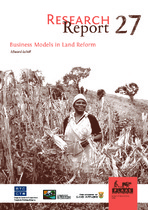| dc.contributor.author | Lahiff, Edward | |
| dc.date.accessioned | 2019-03-07T11:05:43Z | |
| dc.date.available | 2019-03-07T11:05:43Z | |
| dc.date.issued | 2007 | |
| dc.identifier.citation | Lahiff, E. (2007). Business models in land reform. Research Report 27. Institute for Poverty, Land and Agrarian Studies, University of the Western Cape | en_US |
| dc.identifier.uri | http://hdl.handle.net/10566/4401 | |
| dc.description.abstract | This paper reviews the types of business models, or landuse
models, being implemented in land reform projects
involving the transfer of rural land to communities and
other groups in South Africa, under both the restitution and
redistribution programmes. It draws heavily on the series
of Diagnostic Studies prepared as part of the Sustainable
Development Consortium’s (SDC) work on post-settlement
support, but also draws from other studies on restitution,
notably that conducted by the Community Agency for
Social Enquiry (CASE) in 2005, and the wider literature on
redistributive land reform in South Africa.
The aim of this paper is first to identify the types of business
model emerging within land reform, and to analyse
how they have been implemented and the implications
for sustainable development and poverty alleviation. The
subject matter inevitably overlaps with other thematic
papers in this series, particularly that on livelihoods, but
focuses specifically on the business models and aims to avoid
repetition of issues discussed in more detail elsewhere | en_US |
| dc.language.iso | en | en_US |
| dc.publisher | Institute for Poverty, Land and Agrarian Studies, University of the Western Cape | en_US |
| dc.relation.ispartofseries | Research Report;27 | |
| dc.subject | Land reform | en_US |
| dc.subject | Land use models | en_US |
| dc.subject | Business models | en_US |
| dc.subject | Sustainable Development | en_US |
| dc.subject | Land Rights | en_US |
| dc.title | Business models in land reform | en_US |
| dc.type | Other | en_US |

